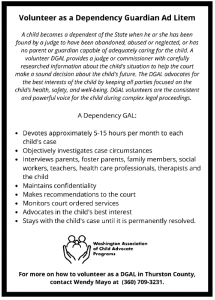A voice for children at risk
In Thurston County, the need for advocates for children who have been relinquished to the foster care system is intensifying. Local volunteers who work with children in foster care report that the pandemic has affected children’s welfare in ways that may be unseen. Recently, a volunteer in the Dependency Guardian ad Litem (DGAL) Program verified that the number of children served over the past year has increased substantially.

Isolation increases the need but decreases reporting
Stressors like homelessness and drug addiction, which may have been exacerbated by the pandemic, have been on the rise. Positive tox screens for newborns in welfare programs show that the numbers of children born with drugs in their system is a large issue. There may be even more children who are in need of advocacy and interventions than are currently being reported due to isolation caused by the pandemic.
The DGAL Program, which partners with the Washington State Family & Juvenile Court System, advocates for children who cannot advocate for themselves to ensure the most vulnerable members of our community are protected. Volunteers receive extensive training to properly support the children they serve.
Wendy Mayo, the Dependency Guardian ad Litem Program Manager for Thurston County Superior Court,.explained how this program serves local abused and neglected youth. The program currently supports approximately 225 children here in Thurston County with 6 paid staff and close to 50 volunteers.
Eyes and ears help the court find a safe home for a child
The “dependency” in the DGAL acronym reflects the fact that children being served by the program are dependents of the State of Washington when there are no capable parents to care for the child. In many cases, parents have voluntarily ended all association with their child.
The ultimate goal of the DGAL program is to find permanent and safe housing for children currently in the foster care system. The permanent home could be that of their parent, adoptive parents,or an appointed legal guardian, or another situation that ensures the child is safe and cared for.
Mayo states that “The DGALs are the ‘eyes and ears’ of the court, appointed to advocate for the best interest of the child within the dependency process.’ DGALs investigate the circumstances of the case they’re assigned to in order to offer interventions and recommendations while advocating for child safety.Providing interventions to keep the children at home with their biological parent is always a first choice, but that is not always possible.
A concern where there is drug addiction
In cases where parents are affected by issues with executive function, mental health, and drug addiction, the court may remove children from the home of their biological family in order to ensure their safety. As some parents struggle with addiction to methamphetamine, or opioids, and sometimes a combination of both, their childrens’ safety is the major concern of those who provide protective services.
While there are many programs to help parents struggling with addiction, some parents fall into recidivism. Based on her experience with children of drug-addicted parents, in the eyes of one volunteer, “meth is one of the meanest drugs there is.” Some parents have had incredible difficulty staying clean after being steeped in addiction to a drug and many are permanently affected by having used it.
Countering the effects of an unstable home
Many parents whose children have been placed in the foster care system participate in Family Recovery Court in order to return to health and repair their families. Many parents who have issues with addiction realize on their own that they have a problem, but some are able to follow through only with the support provided by the courts. Some even freely relinquish their newborns or older children to ensure that their children receive proper care.
Some of the parents have no experience with what many consider to be a “regular” life: “they live with a different set of routines’’ and are not able to maintain things most would consider a daily practice in adulthood. Often such parents lack the things that are typically important to raising a healthy child—the ability to keep a schedule, to have a job, to manage a bank account or provide a stable home life.
The importance of the parent and child connection
DGALs ensure that children are provided appropriate care while in foster care and they observe interactions with parental visitations as dictated by the court. Parents who want to remain in contact with their children will never be denied the opportunity to maintain the relationship.
Even where parents are struggling with dependency, the courts can’t deny them contact with their children. For example, parents don’t have to be clean to visit with their children; the courts can allow supervised visits to help parent and child to stay connected. Hopefully, as parents heal from addiction and learn effective childcare practices, the supervised visits can lead to a child returning permanently to the home of their biological parents.
Training for volunteers is followed by continuing support
DGALs receive extensive training in order to provide appropriate care for the children they serve. Mayo described a training program that is designed to help volunteers develop an understanding of how to support the whole child. This includes 35 hours of initial training that DGALs complete along with support as they prepare to begin working with a child.
Mayo discussed the relationship between the 50 active volunteers and their supervisors who are employed by the program. The volunteers do more than just supervise visits and observe children in foster care settings. While some volunteers may have experience in the legal field, DGALs are not attorneys. Paid supervisors are there to ensure that complicated legal matters that arise in some of the cases are properly addressed.
Identifying and meeting the child’s needs
DGALs are advocates for the children they serve in the school day and ensure that the child is receiving support and interventions to help each child be successful in their academics. DGALs often attend team meetings with counselors, special education teachers, and general education teachers to ensure that caregivers are aware of interventions and supports for the child. They ensure proper implementation and support during and after school hours.
Some children come to the program with significant health concerns. DGALs ensure that dental and medical needs are taken care of and where mental health and other services are needed for the child to thrive, they make sure those are provided as well. While most of the contacts with the children in the program have been through Zoom during the past year, DGALs usually get to meet the children they serve in-person at least once monthly.
Volunteers come from many walks of life
The DGAL program is actively recruiting volunteers. New volunteers will receive 35 hours of training through Zoom in sessions lasting a couple hours per day. Once certified, DGALs participate in about 12 hours of continuous education annually while serving in the program. Upcoming training will begin in May and at the end of this summer.
Current volunteers are from a variety of walks of life. About half are retired and half have full-time employment and volunteer on the side. Some of the volunteers are former foster kids who want to help children just like they were once helped.
When children can thrive, outcomes are remarkable
A long-time volunteer thought recently of her many years in the program. While some of the things she has witnessed are troubling, she is comforted in her role and the opportunity to help protect children. She said she always keeps in mind that these are “children who are victims of victims. They didn’t choose to have this lifestyle.”
Ultimately, Mayo reflects, there are remarkable outcomes for the children they serve. “Some of the kids that are supported in the program were drug affected, mentally delayed, or vulnerable in other ways. It is amazing to see the kids thrive once supports have been provided.”
Ilana Smith is an avid reader, wishful traveler, and an advocate for child welfare who has laid down roots in Lacey.
To learn more about becoming part of a program that makes a difference in the life of a child who has been abused or neglected, visit the Thurston County Superior Court’s Dependency Guardian ad Litem Program or contact the program at (360) 709-3137.

Be First to Comment